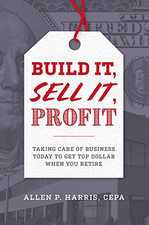| Home | About | Archives | RSS Feed |

The Independent Investor: How Prepared Are You to Sell Your Company?
 |
If you are a small-business owner and are toying with the idea of someday selling your company, you should pay attention. Only one in five small businesses put up for sale result in a closing. How do you become one of those success stories?
Where I live and work, nestled in the Berkshire Mountains of Massachusetts, there are relatively few large companies. We are over-populated with "Mom and Pop businesses." As such, I meet and talk to plenty of these enterprise owners daily. An overwhelming number of these entrepreneurs have saved little or nothing towards their retirement.
Instead, they believe that at some point, someone would swoop in and buy their business, guaranteeing a financially secure retirement. Despite taking a hardline approach to the realities of running a business, most owners do not have a realistic sense of how to sell a business. The two are completely different animals.
I recently got an education in the difference by reading a book written by Allen P. Harris (owner of Berkshire Money Management where the columnist works) titled "Built It, Sell It, Profit." It's a slim book, well-written in layman's terms, which I suggest you pick up. In it, Harris addresses the big questions that need to be answered if you have even a hope and a prayer of selling your business.
The first question to ask is "What should I be doing today to build my business toward "maximum value?"
Harris would tell you that you will need to begin planning that sale for at least three to five years ahead of time. The things that you overlook in your day-to-day running of the business won't be overlooked by a potential buyer. Think of it in the same way you would approach getting in shape at the gym. You need a plan, and to figure out how the machines work and which ones to use.
In your firm, you will need to start documenting your workflows, your business procedures, hire the employees that will be needed, and in general, clean up your act before showing your business to any potential buyers.
"Think big," says Harris, "Strategic planning is a process of setting bold, long-range goals and then working backward to determine the steps needed to get there."
Another important question to ask is what your business is worth? You may know how much money you put into it, how much that new roof cost, or that line of trucks outside on the newly-paved blacktop but how much will a potential buyer be willing to pay for all that? Not to mention putting a value on the blood, sweat and tears you have invested in it over the years.
Most businesses need an independent valuation by an expert who can compare your firm to others in the same business. That's going to cost you and more than likely you won't take kindly to the answers. Unfortunately, most owners think their business is worth far more than it is.
The burning question I hear more than any other, is "If I were to decide to sell my business, would I get enough money so that I would be able to maintain my lifestyle and take the next step in life?" We will discuss that answer, as well as raise several other issues you might want to consider.
Bill Schmick is registered as an investment adviser representative and portfolio manager with Berkshire Money Management (BMM), managing over $400 million for investors in the Berkshires. Bill's forecasts and opinions are purely his own. None of the information presented here should be construed as an endorsement of BMM or a solicitation to become a client of BMM. Direct inquiries to Bill at 1-888-232-6072 (toll free) or email him at Bill@afewdollarsmore.com.

